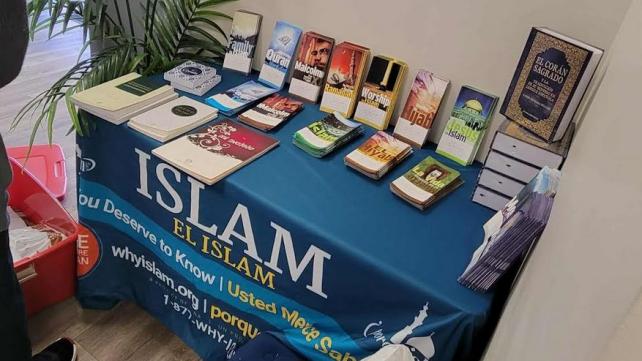
Muslims have long faced criticism and hostility from those who oppose their faith. Even the Prophet Muhammad (peace and blessings be upon him), who was respected as honest and kind before his prophethood, endured rejection and abuse from his own tribe after calling them to worship God alone. All prophets experienced similar hardships for their unwavering commitment to their faith. As Muslims in the 21st century, we too may face insults and prejudice. Yet, despite these challenges, people continue to embrace Islam in growing numbers and from diverse backgrounds. Among them is the Latino community, the fastest-growing minority within Islam in recent decades. Like the Prophets and righteous before us, many Latino Muslims encounter resistance from their families and peers, yet their faith remains steadfast.
When I was new to Islam, it often felt overwhelming and disheartening to hear hurtful misconceptions from those who were close to me. Over time, however, I came to understand that people often fear what is unfamiliar. Whether or not you are of Latino background, as a Muslim, you and your children are likely to encounter people from Latin America, like my family. Many are open to learning about Islam, and their curiosity can spark meaningful dialogue. At the same time, some may hold assumptions shaped by negative media portrayals, divisive political discourse, or misinformed hearsay. As Muslims, we must be prepared to respond with patience and wisdom, first and foremost by modeling good character, and by equipping ourselves and our children with sound knowledge.
What follows are some of the most common misconceptions about Islam in the Latino community and ways that Muslims can address them. These insights come from years of experience in dawah, personal experience with my relatives, and conversations with other Latino Muslims. While these fallacies are not unique to Latinos, they frequently surface in Latino families and communities.
Myth 1: Muslims worship the Kaaba or Prophet Muhammad, peace and blessings be upon him.
A common misconception in the Latino community is that Muslims worship the Kaaba instead of Dios (God). This confusion often arises from images of Muslims bowing in prayer toward the Kaaba in Mecca. Since many Latinos come from Catholic or Christian backgrounds, they may also misinterpret the deep love and respect Muslims have for the Prophet Muhammad, peace and blessings be upon him, as worship. These assumptions are sometimes influenced by their own religious practices, such as praying before statues, venerating the cross, or directing devotion toward images of Jesus.
Response: Islam teaches that Allah created humankind for the sole purpose of worshipping Him, as mentioned in the Quran:
“I did not create jinn and humans except to worship Me” (Quran, 51:56).
To establish unity in worship, Allah revealed clear instructions about the direction of prayer (qiblah):
“Indeed, We see you ˹O Prophet˺ turning your face towards heaven. Now, We will make you turn towards a direction ˹of prayer˺ that will please you. So turn your face towards the Sacred Mosque ˹in Mecca˺—wherever you are, turn your faces towards it...” (Quran, 2:144)
Muslims worldwide face the same direction in prayer; the Kaaba, therefore, is not an object of worship but a symbol of unity. The Quran repeatedly emphasizes that worship is reserved for Allah alone and that directing prayers to anyone or anything else is sinful and without meaning. Similarly, while Muslims hold the Prophet Muhammad, peace and blessings be upon him, in high esteem, we do not worship him. He was a man, chosen by Allah to deliver His final message. As the seal of the prophets and the one to whom the Quran was revealed, his role was that of a messenger, not a deity.
Myth 2: Muslims do not believe in Jesus or the Virgin Mary.
A widespread misconception among Latinos (and even among non-Latinos) is that Muslims reject belief in Jesus, peace be upon him. In reality, Muslims believe in all the prophets and messengers sent by Allah throughout human history, and that includes Jesus, the son of Mary, peace be upon them both. Similarly, many are unaware that Muslims honor Mary as a noble, virtuous woman chosen by Allah and that we believe in the miraculous birth of Jesus.
Response: Far from denying Jesus and Mary, Muslims deeply respect and admire them as true examples of faith and devotion. Belief in all of Allah’s prophets and messengers, including Jesus and Muhammad, peace and blessings be upon them, is an essential pillar of the Islamic faith. A Muslim is not truly a Muslim if he or she rejects them. Allah says in the Quran about Jesus:
“Remember˺ when the angels proclaimed, “O Mary! Allah gives you good news of a Word from Him, his name will be the Messiah, Jesus, son of Mary; honoured in this world and the Hereafter, and he will be one of those nearest ˹to Allah˺" (Quran, 3:45)
And about Mary herself, Allah declares:
“And [mention] when the angels said, ‘O Mary, indeed Allah has chosen you and purified you and chosen you above the women of the worlds.’”
Mary, peace be upon her, is the only woman mentioned by name in the Quran, and an entire chapter, Surah Maryam, is named after her. Allah not only narrates her story in detail but also defends her honor against false accusations. In addition, the Prophet Muhammad (peace and blessings be upon him) said:
“The best of women among the people of Paradise are Khadijah bint Khuwaylid, Fatimah bint Muhammad, Maryam bint Imran, and Asiyah bint Muzahim, the wife of Pharaoh.” (Musnad Ahmad, 2896)
Thus, Muslims hold both Jesus and Mary, peace be upon them, in the highest regard. We love and respect them with the dignity they deserve, without elevating them beyond the rank that Allah has decreed but recognizing them as among the most honored figures in history.
Myth 3: All Muslims are Arab
A common misconception in the Latino community is that all Muslims are Arabs—and that all Arabs are Muslim. My own family once struggled with this false generalization due to their limited knowledge of Islam.
Response: Muslims come from every background and nationality imaginable. In fact, the country with the largest Muslim population is Indonesia, whose people make up nearly 13% of the global Muslim population (Pew Research Center, The Future of the Global Muslim Population, 2011). From the earliest centuries of Islam, people far beyond the Arabian Peninsula embraced the faith through their interactions with Muslims. Islam is not reserved for one race, ethnicity, or culture; it is a way of life revealed for all of humanity. Today, Islam is the fastest-growing religion worldwide, including among Latinos in both the United States and Latin America. This growth itself proves that Islam transcends Arab identity.
Even in the time of the Prophet Muhammad, peace and blessings be upon him, many of his most beloved companions were not Arab. Bilal ibn Rabah was from Abyssinia (modern-day Ethiopia), Salman al-Farsi was Persian, and Suhaib ar-Rumi was raised as a Roman. Likewise, some of the greatest scholars of Islam came from non-Arab regions, such as Imam al-Bukhari, Imam Muslim, Ibn Taymiyyah, and Imam an-Nawawi. Latinos may be especially surprised to learn that renowned Muslim scholars like Qadi Iyad, Ibn Arabi, and al-Qurtubi hailed from Muslim Spain (Al-Andalus).
Myth 4: Muslim women are oppressed, and Muslim men are abusers.
One of the most persistent misconceptions in the Latino community is that Muslim women live under oppression and are forced into submission to abusive husbands. Because this is a sensitive and deeply personal issue, it deserves careful attention to correct this unfair notion about Muslims.
Response: It is misleading to single out Islam or Muslims as promoters of oppression or abuse. Sadly, violence against women is a global problem that exists across cultures, religions, and societies, including the United States and Latin America. To blame Islam for the actions of abusive individuals is as unfair as blaming Christianity, Buddhism, or any other faith when a follower commits the same wrong. Islam condemns oppression and upholds the dignity of women. Allah describes the marital relationship in the Quran as one of tranquility, love, and mercy:
“And one of His signs is that He created for you spouses from among yourselves so that you may find comfort in them. And He has placed between you compassion and mercy. Surely in this are signs for people who reflect.” (Quran, 30:21)
Marriage, therefore, is meant to be a source of comfort and compassion—not hardship or fear. If Allah Himself has defined the marital bond in these terms, then oppression and abuse have no place in a Muslim household. The Prophet Muhammad, peace and blessings be upon him, set the best example of kindness and respect in family life. He said:
“The best of you are the best to their families, and I am the best to my family.” (At-Tirmidhi, 3895)
He also encouraged kind treatment towards women in general. Muslim men are instructed to follow the Prophet’s model of gentleness, fairness, and care toward their wives and children.
Myth 5: Islam is not compatible with Latino culture
If non-Muslim Latinos accept the earlier misconceptions, it is not surprising that they may also believe Islam is incompatible with Latino cultures. After all, Latino traditions often emphasize devotion to Jesus and Mary, strong family ties, and moral values rooted in Abrahamic faiths. What many do not realize, however, is that Islam has already shaped the foundations of their cultures in many ways.
Response: Practicing Islam does not require Latinos to abandon their cultural identity. Latino Muslims can still enjoy their traditional foods, speak their languages and dialects, and wear their cultural attire. Islam only redirects devotion to one God alone and sets boundaries around certain practices. For example, Islam prohibits the consumption of pork and alcohol, as well as the observance of holidays rooted in other faith traditions. At first glance, these restrictions may seem like a rejection of Latino culture. Yet, when we examine the origins of many of these customs, they are not rooted in authentic Latino ancestry but rather in later influences brought by colonization.
In fact, a closer look at history shows that Islam is intertwined with Latino cultural identity. Spain—whose language, culture, and traditions form the backbone of Latin America—was under Muslim rule for over 800 years before the colonization of the Americas. Furthermore, Islam was present among enslaved Africans who were forcibly brought to Latin America, many of whom were Muslims. Thus, Islam is not foreign to Latinos. It is deeply embedded in their traditions, language, and history. For many Latinos like me, embracing Islam was not leaving our culture behind, but rather reconnecting with our roots.
When approaching these conversations, remind yourself and your children that Islam is not limited to those born into the faith or those already guided by Allah. As Muslims, we believe that Allah sent messengers to every nation throughout history to call people to His worship. This means that everyone, especially our Latino family, neighbors, and friends whose cultures have been influenced by Islam, deserves the opportunity to learn about Islam. Latinos can be Muslim, and Muslims can be Latinos. The only requirement to enter Islam is sincere belief that Allah is One, worthy of worship alone, and that Muhammad ibn Abdullah (peace and blessings be upon him) is His final messenger. It is our sacred duty to challenge the myths and misconceptions that exist about Islam. That work begins with changing our own attitudes and approaching others with patience, wisdom, and respect.





Add new comment